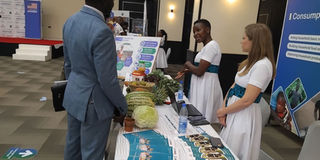
Experts from AVSI showcasing to stakeholders products produced by farmers in Rwamwanja refugee settlement. PHOTO/Lominda Afedraru
Despite the inclusive policies that grant refugees land for farming as well as the right to work and move freely in Uganda, a lack of economic opportunities means that a good number of refugees continue to rely on emergency distributions of food and cash to meet their basic needs.
According to the statistics by Food and Agriculture Organisation (FAO) more than 90 percent of refugees are highly economically vulnerable, with more than one third experiencing food insecurity.
Refugees have long said that relying on emergency assistance is not a long-term solution. They wish to become self-reliant and simply need the tools and skills to do so.
As such experts from the Association of Volunteers in International Service (AVSI) have been training refugees in Rwamwanja refugee settlement and host communities in Kamwenge District with various skills among others good farming practices for better livelihoods.
Background
In 2018 experts from AVSI began implementing a project named Graduating Reliance for refugee and host communities surround Rwamaja refugee settlement.
The project was funded by USAID to a tune of $36.7million and aimed at skilling extremely poor refugee households who fled from the Democratic Republic of the Congo (DRC).
AVSI consortium targeted the underlying causes of food insecurity with a sustainable cost effective adaptation of a graduation approach where participants form groups and are coached by experts until when they graduate.
This was aimed to improve food security and nutrition status of household members, improve household economic status and increase resilience of household members and communities.
The project which has come to end led to a number of refugee communities embracing farming commodities namely crops such as beans, maize, Irish potatoes, green vegetables, poultry and livestock among others.
The US Ambassador to Uganda William W. Popp notes that it is important to work with partners and invest money in improving livelihoods of refugees and host communities.
To him it is clear that the communities attained the required skills especially in embracing farming which has impacted their livelihoods by having the required nutritional diets
Coaching the groups
The head of the project Innocent Cwinyai explained that his team selected participants and made them to form groups who are allocated coaches with expertise in farming practices, finance literacy and social expertise among others.
One coach works with 25-30 participants at household level and in the first cohort there were 260 groups and 288 group in the second cohort. This involved 50 percent refugees and 50 percent host communities.
The topics included farming and nutrition at household level, basics of gender, WASH and meal planning among others.
The total participants skilled who graduated amounted to 13,600 and in the initial process participants are given $1,000 per household as a start off where others opted to hire land from host communities for farming, other engaged in businesses such as tailoring, crafts and agribusiness selling agricultural commodities.
The farming initiative
Ms Patricia Aber programme manager at AVSI explained that the agricultural commodities selected for the project included maize, Irish potatoes, beans, groundnuts, pig and goat rearing and vegetable growing.
Groups who opted to rear pigs were given one pig each for learning purposes and were skilled on how to handle pig rearing to achieve the required pigs as income earning initiative.
Those who wanted to rear goats were also given one goat per group and taken through the best practices for improved production.
Along the way households purchased either pigs or goats which they began rearing in their homesteads and at the end of it all they were able to achieve improved production which most of them are commercialising now.
All groups were interested in growing all most all of the crops identified above and they were grouped into farmer field business schools.
The trainers skilled them in all best practices for each crop right from tilling the land, planting, seed selection and harvesting.
However much of the emphasis was on how to embrace climate-smart agriculture where farmers are urged to embrace improved seed varieties which are drought tolerant, resistant to pests and diseases, observing the weather partners and listen to radio programmes where experts are alerting them on early warning system.
The skilling took place in demonstration gardens for each crop where farmers converged every week for practical training.
The experts worked with 554 groups who were interested in farming comprising of 13,267 individuals.
Most refugee participants are now implementing farming in the small plots of land they are allocated while others go out to hire land from host communities to expand their farming initiative.
They were sensitised and skilled in making their own manure from animals waste because majority are keeping pigs and goats.
The testimony is that majority have now transformed their agriculture practices and are getting better yields.
Food security and nutrition
Under this segment the experts note that most of the community members are refugees who previously did not mind about their household diet and this led to challenges of malnutrition affecting mainly infants.
They were skilled on how to plan housed meal which must comprise of food with all food values namely carbohydrates, vitamin and protein among others.
The communities were therefore encouraged to plant vegetables such as cabbages, sukuma wiki, nakati and amaranth among others.
Challenges
There were challenges of participants dropping out from the skilling activities especially those who opted to return to their home country but the number was minimal.
Others decided to divert their financial support to businesses which they could manage.
However, overall 80 percent of the participants graduated and are now engaged in farming while engaging in best practices.




